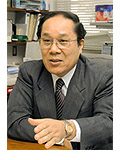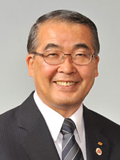Are we approaching a world without nuclear weapons?

Thank you so much for your participation in the sixth Nagasaki Global Citizens' Assembly for the Elimination of Nuclear Weapons. It has already been five years since the last conference was held in 2013. The global sentiment regarding the abolishment of nuclear weapons has undergone dramatic transformation since then, with discussions concerning the inhumane nature of nuclear weapons now exerting strong influence on public opinions worldwide. As a result of multilateral negotiations, the Treaty on the Prohibition of Nuclear Weapons, dedicated to addressing the inhumane threats of nuclear weapons, was finally adopted on July 7th, 2017 at the United Nations. As of early October, 69 countries have signed the treaty, and 19 have ratified it. It is hoped that the treaty will enter into force quickly. Meanwhile, in December last year the International Campaign to Abolish Nuclear Weapons (ICAN) was awarded the Nobel Peace Prize in recognition of its significant contribution to the adoption of the Treaty on the Prohibition of Nuclear Weapons. The citizens of Nagasaki, who together with the hibakusha (atomic bomb victims) have been a part of the campaign, were given great joy and new courage. However, a group of 30 countries, including those with nuclear weapons and their allies, Japan and NATO nations, to cite incessant conflicts and global security turmoil as they maintain and support nuclear-deterrence policies. They refuse to sign, or let alone negotiate, the treaty, and even apply pressure on its advocates. These two broad currents may indicate that the approach to the abolishment of nuclear weapons will see a split. This trend goes against the noble and common goal of realizing a world without nuclear weapons as set forth in Article 6 of the Treaty on the Non-Proliferation of Nuclear Weapons (NPT), stifling an effort toward nuclear disarmament. The people of Nagasaki, a city that has experienced atomic bombing, view this development with grave concerns. The main thrust of this event is to display the people power as symbolized by the signing of the Treaty on the Prohibition of Nuclear Weapons and the awarding of the Nobel Peace Prize to the ICAN, and explore a new direction for our endeavor. Nuclear researchers, experts, NGO representatives, citizens, students, and children have all gathered here in Nagasaki, which has remained the world's last atomic bomb site for 73 years. It is our sincere hope that this city will become a place to declare the beginning of the final chapter of nuclear disarmament as we seek to overcome the current divide and establish an international norm so that nuclear weapons will never again be used.
Masao Tomonaga Chairman Organizing Committee of the Nagasaki Global Citizens' Assembly for the Elimination of Nuclear Weapons
Houdou Nakamura Governor of Nagasaki Prefecture

On this occasion of the 6th Nagasaki Global Citizens' Assembly for the Elimination of Nuclear Weapons, I would like to express my sincere appreciation as governor of the host prefecture to all those attending from both Japan and overseas. On August 9th, 1945, the single atomic bomb dropped here in Nagasaki destroyed the city in an instant and took away the lives of more than 74,000 people. 73 years later, through the concerted efforts of the citizens of Nagasaki Prefecture, this city has been reborn from the ruins as a beautiful city filled with greenery that yearns for peace. However, for those families who lost loved ones, even after 73 years, their sadness still remains. Furthermore, the hibakusha, the victims of the atomic bombings, still suffer even now from inerasable scars and from the health effects caused by radiation. Last year, the Treaty on the Prohibition of Nuclear Weapons was adopted by the United Nations, and ICAN received the Nobel Peace Prize. Also, with the Inter-Korean and the North Korea-US Summit held this year and agreement made to work towards the complete denuclearization of the Korean Peninsula, there is currently a great deal of momentum towards the abolition of nuclear weapons.
At the 73rd Nagasaki Peace Memorial Ceremony for the Victims of the Atomic Bombing, held on August 9th this year, Secretary-General of the UN, António Guterres said "Let us all commit to making Nagasaki the last place on earth to suffer nuclear devastation". At the same time, movements to increase the role of nuclear weapons and opposition to the advancement of nuclear disarmament can even now still be visible in the countries concerned.
The use of nuclear weapons is absolutely unforgivable under any circumstances.
In order to achieve the abolition of nuclear weapons, we must correctly understand the inhumanity of nuclear weapons, and both nuclear and non-nuclear states must work together and discuss in the spirit of mutual trust. With the desire "to make Nagasaki the last place to be atomic bombed" as our creed, we the people of Nagasaki Prefecture will continue to convey the tragedy and inhumanity of the atomic bombing to the people of the world. We will continue to call for the realization of "A World Free of Nuclear Weapons" without delay. I conclude this message by expressing my heartfelt gratitude to the honored guests and all those present today, and by conveying a sincere wish for your continued good health and success.
Tomihisa Taue Mayor of Nagasaki

It is my pleasure to extend this message to you all on the occasion of the "6th Nagasaki Global Citizens' Assembly for the Elimination of Nuclear Weapons." I am delighted that we have many participants gathered here in Nagasaki, overcoming differences in age and national borders, all here with the goal of eliminating nuclear weapons. With the increasing influence of the civil society and the international and domestic NGO's within it, in the United Nations and the international community, the theme of this conference is, "Realizing a world without nuclear weapons; with the power of the Treaty on the Prohibition of Nuclear Weapons and ICAN's Nobel Peace Prize." Last year, in July, the prayers of the atomic bomb survivors, the hibakusha, and the citizens of Nagasaki over the many years bore fruit with the United Nations adopting the Treaty on the Prohibition of Nuclear Weapons, and in October, the Nobel Peace Prize being awarded to the International Campaign to Abolish Nuclear Weapons (ICAN) for their tireless efforts made towards the enactment of a nuclear weapons ban treaty. This year, major events have also taken place in Nagasaki which have heightened momentum toward the abolition of nuclear weapons. At this year's Annual Nagasaki Peace Ceremony, the Secretary-General of the United Nations, H.E. Mr. António Guterres, attended for the first time as an incumbent Secretary-General, where he gave an encouraging speech addressing to the world, "Let us all commit to making Nagasaki the last place on earth to suffer nuclear devastation." Before attending the ceremony, the Secretary-General met and spoke with several hibakusha from Nagasaki and Hiroshima, and visited the Atomic Bomb Museum, where he also made paper cranes with some local elementary school students. For the hibakusha, the children who will be responsible for the next generation, and the citizens of our city, being able to express our wishes for peace and the abolition of nuclear weapons directly to the head of the United Nations was an extremely valuable opportunity. On the other hand, within the international community, it is estimated that there still exist over 14,000 nuclear warheads across the world. Together with the cooperation of the civil society, we must express to the world our desires for a world without nuclear weapons now more than ever before. Through this assembly, I hope that, together with the youth who will become the future leaders of the civil society, we will actively discuss from various points of view on what we, the civil society, can do to contribute to a world without nuclear weapons. I also hope that we can further appeal to generations young and old across the world for the abolition of nuclear weapons. In closing, I would like to extend my heartfelt gratitude to everyone in attendance, and I sincerely hope that this assembly will be a successful one.
